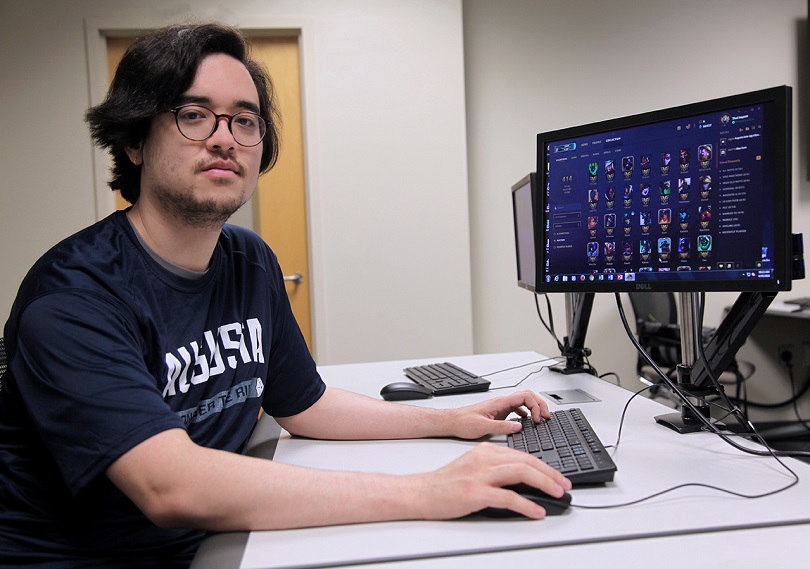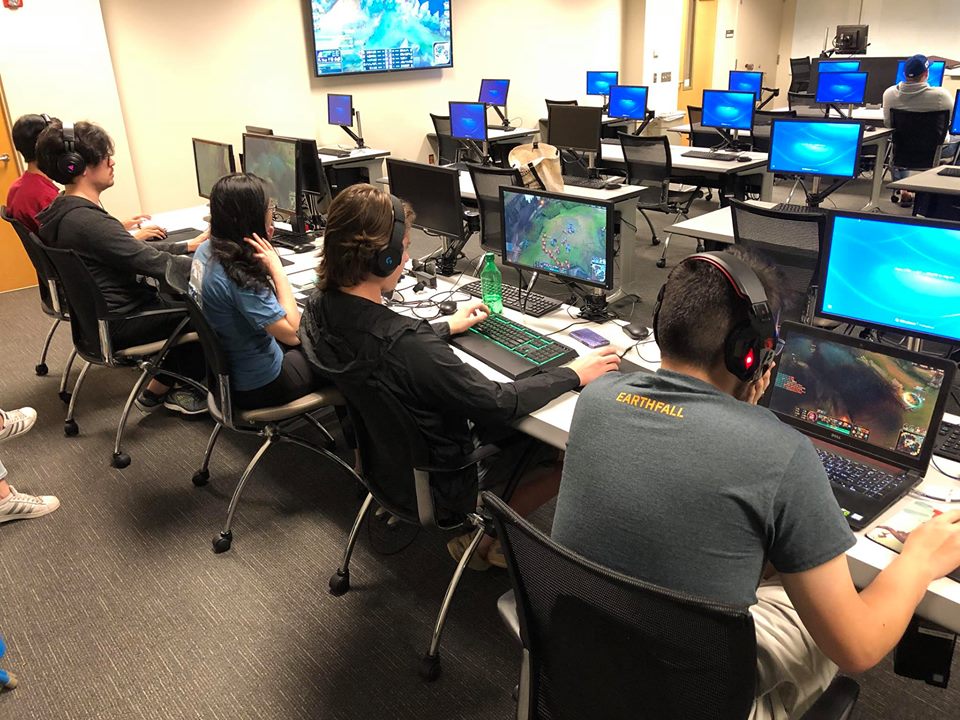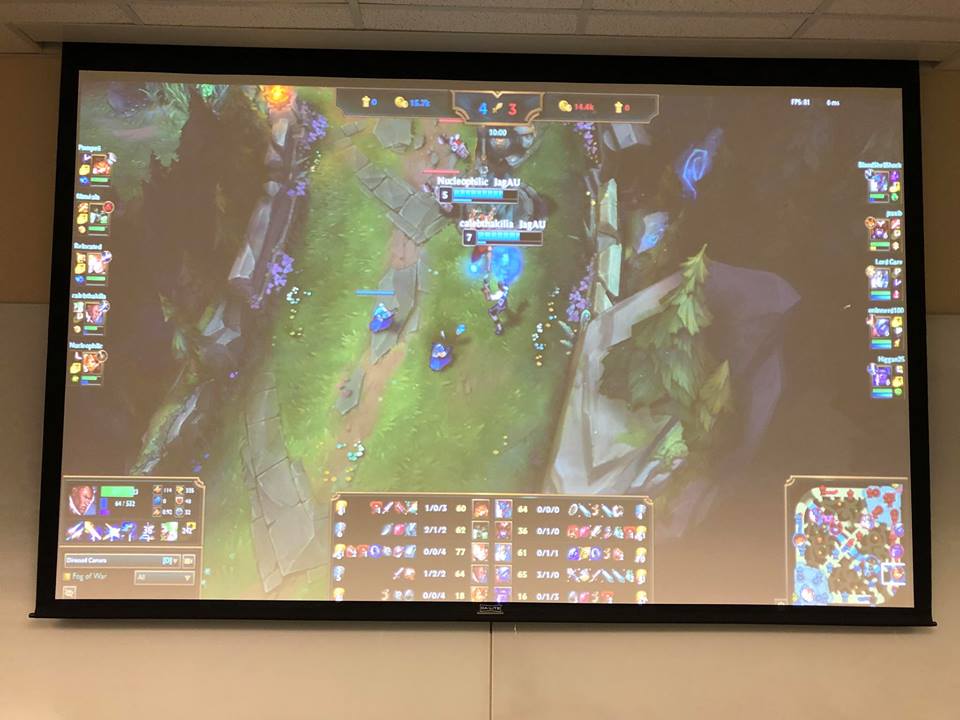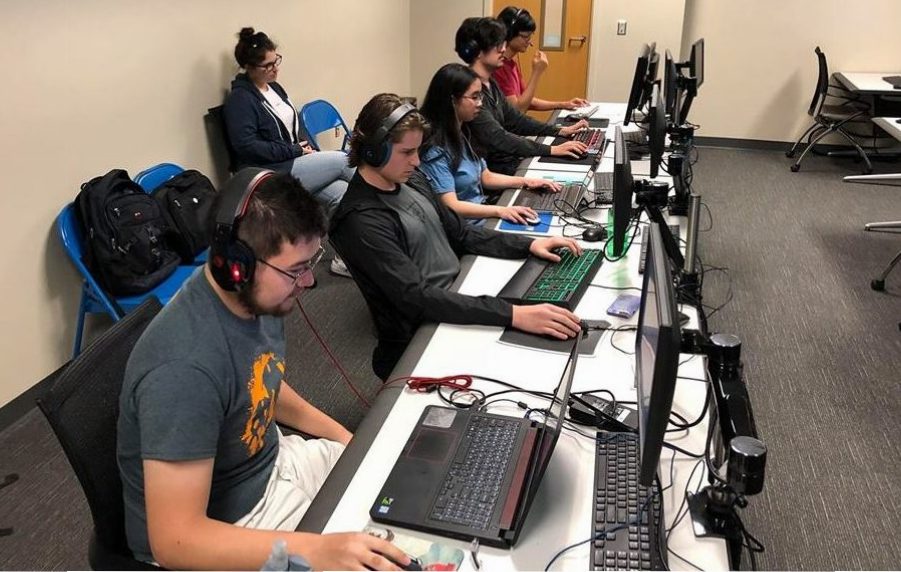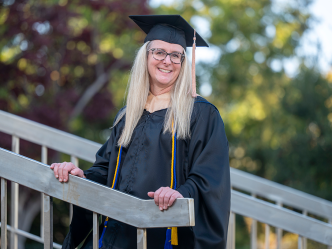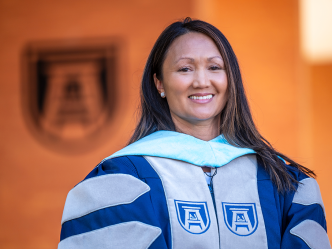Aaron Chestnut, Computer Science
For many, graduation day offers a chance to reflect on the journey taken from the first day of class to walking across the stage to get a diploma. For Aaron Chestnut, a computer science major, his memories of senior year will be dominated by representing Augusta University in a sport. However, we’re not talking about the kind of sport you’re probably used to.
“I remember it was seven in the morning in January this year,” he said. “I was in bed when I got an email saying Augusta University was recruiting League of Legends players to start an official team.”
At first, Chestnut said, he thought he was dreaming. However, as it turned out, the opportunity was very real. The NCAA had joined forces with Riot Games, the creator of League of Legends, and the Peach Belt Conference in 2018 for the first “officially sanctioned” League of Legends competition.
Chestnut’s love of video games started when he was around eight or nine. It was the early 2000s and online gaming was in its infancy. Before the internet, multiplayer games were largely “couch co-ops” played when a friend came over after school or on the weekend.
“My first online game was Blizzard’s StarCraft.” Chestnut said. “I spent a lot of time learning tactics and strategies and using what I learned to play against other people through the BattleNet system.”
Even though he was interested in video games and computers, a degree in the field wasn’t his first thought after high school.
“I wanted to work in the medical field,” he said. “I went to the University of Georgia before getting accepted into the nursing program at Georgia Health Sciences University (GHSU) after two years in Athens.”
However, a few classes and some soul searching later, Chestnut left GHSU. While he wasn’t sure what his future college career would bring, his love for video games never wavered.
“I started competing in tournaments across the country in the fighting game Marvel vs. Capcom,” Chestnut said. “I even received a full scholarship offer to Maryville University in Missouri.”
Chestnut says a representative from Maryville put the scholarship on the table if he would come to compete for the school and coach other players on the team in Marvel vs. Capcom. Instead, Chestnut decided to pursue a career in computer science at the Hull College of Business.
“Several members of my family mentioned the computer science program at Augusta University,” Chestnut said. “They told me they thought it would be something I would be interested in.”
So despite having attended multiple schools, including UGA, Georgia Military College and auditing classes at Harvard, Chestnut ultimately chose Augusta University to get his degree.
“I had family in Augusta. I had my friends. I spent time at GHSU, so there were roots in Augusta,” he said.
With Augusta University growing in offerings and reputation, Chestnut feels like there will be a tonal shift in how people living in Augusta view the university.
“There are lots of students who can’t wait to get away from home after high school,” he said. “But, I think it would be worth their time to look into the variety of degrees and classes available to them at Augusta University. I think they would be surprised by the opportunities we have here at home.”
I never felt lost at Augusta University. If I needed help, there was always a resource easily accessible.
— Aaron Chestnut
Chestnut says the smaller classes were beneficial for him and other people in his class.
“I never felt lost at Augusta University,” Chestnut said. “If I needed help, there was always a resource easily accessible.”
One particularly important resource has been Dr. Harley Eades, an assistant professor in the Department of Computer Science.
“He pushed me to learn more than I thought I could,” Chestnut said. “I’ve taken a wide spectrum of classes during my time at Augusta University, including organic chemistry. That class was a breeze compared to the curriculum Dr. Eades has created.”
When he wasn’t studying for those classes, Chestnut said he could be found in front of a computer screen sharpening his skills in a new video game, League of Legends.
“Around 2012, some of the people I played Marvel vs. Capcom against competitively started talking about this new game they were playing,” he said. “I was familiar with the concept from other games I’d played.”
Six years later he was preparing to represent Augusta University in Peach Belt competition.
“I remember walking into the first [League of Legends] information meeting feeling excited and anxious,” Chestnut said. “But it was amazing to meet other people who played the game and were ranked higher up the leaderboard like I am.”
With the regular season starting just two weeks after that first meeting, the team’s administrator worked overtime to find a team captain to lead the squad. The person who landed the captain’s role: Aaron Chestnut.
“The opportunity meant a lot to me,” he said. “It was both exciting and stressful. Exciting because I had an opportunity to get into that competitive environment again, like I had with Marvel vs. Capcom.”
As for the stressful side, it came from the management side of being the captain of 20+ people who wanted to be part of the team. Because there are only five players actually competing, Chestnut was going to have to make the tough calls on which players had the best chance at forming a competitive team.
“There was a lot of school pride involved,” he said. “I know my sense of pride deepened as the season went on. I feel like it was the same for my teammates.”
“We never were on sports team or were able to do something that represented our school,” Chestnut said. “This team was the first time, and it meant a lot to see Augusta University and the Peach Belt Conference invested in making it successful.”
There was a lot of school pride involved. I know my sense of pride deepened as the season went on.
— Aaron Chestnut
During the regular season, the team won seven games in a row and went into the Peach Belt Conference Tournament with a winning record. Unfortunately, they lost on the second day of competition. While it wasn’t the result they wanted, Chestnut said it was an amazing experience.
“We knew where the tournament was being held, but when we walked into the Magnolia Ballroom at Georgia College, we had no idea how much work had gone into the production value of the venue.”
Chestnut said there were fancy lights, cameras, game casters and a crowd that filled the seats in the ballroom during the first day of competition.
“They were so loud that day.”
As his college career ends, Chestnut’s already thinking about what’s next. And as you might imagine, League of Legends has a role to play.
“I want to build a second computer and focus on streaming my games to draw a crowd that could donate money to me during the summer months,” he said.
It’s a viable option. According to a report by CNBC, on average professional gamers with a large subscription base can use the streaming service Twitch and make $3,000 to $5,000 each month if they play around 40 hours a week.
After the summer ends, he’ll be starting his career in the computer science field. He’s interviewing for a number of full-time job opportunities, including with an engineering company in Boston where he worked as an intern.
“It’s something I learned from playing League,” he said. “If your first course of action doesn’t work out, you need to have a back-up plan and a back-up plan to the back-up plan.”
What can you do with a computer science degree?
Read about career opportunities in computer science or learn more about how Augusta University is educating the next generation of computer and cyber professionals — right here in Augusta, Georgia.
At Augusta University, success is a choice.
This spring, we celebrate graduating seniors by recognizing students who are choosing to better themselves and their communities in 2018.
Celebrate with these members of Jaguar Nation and the entire Class of 2018 using the hashtag #AUGGRAD.
 Augusta University
Augusta University
